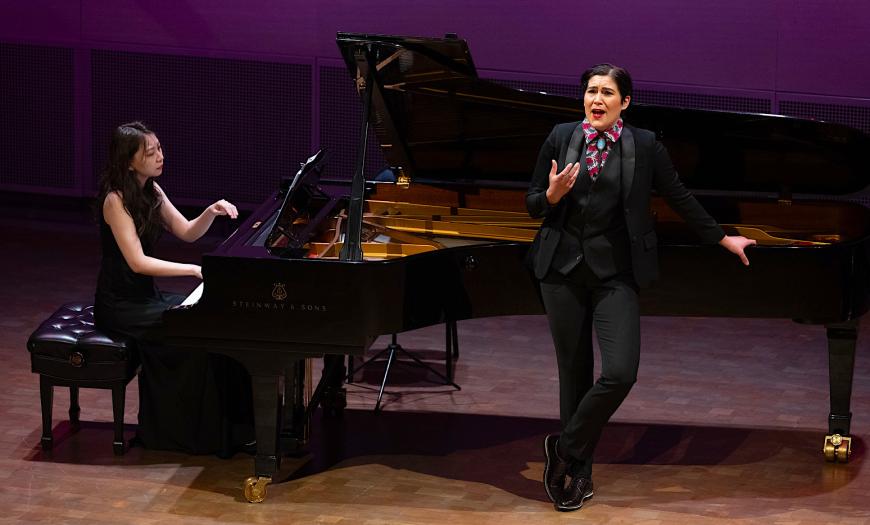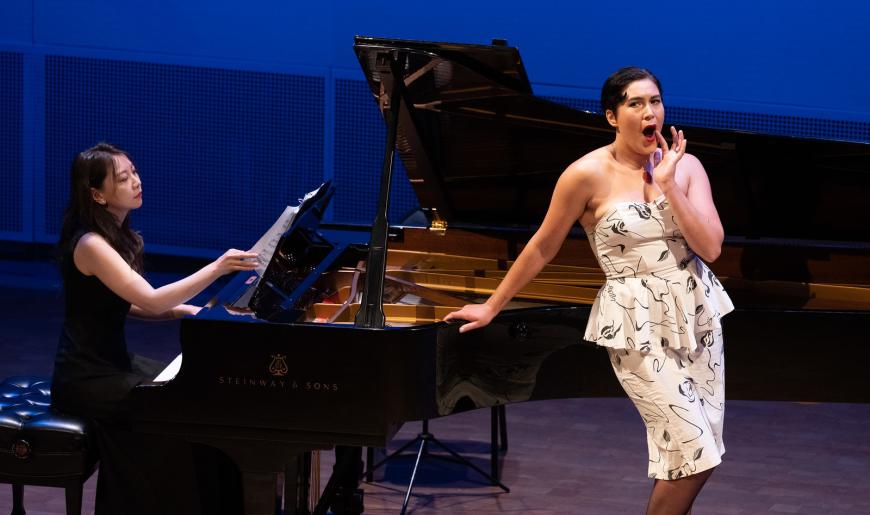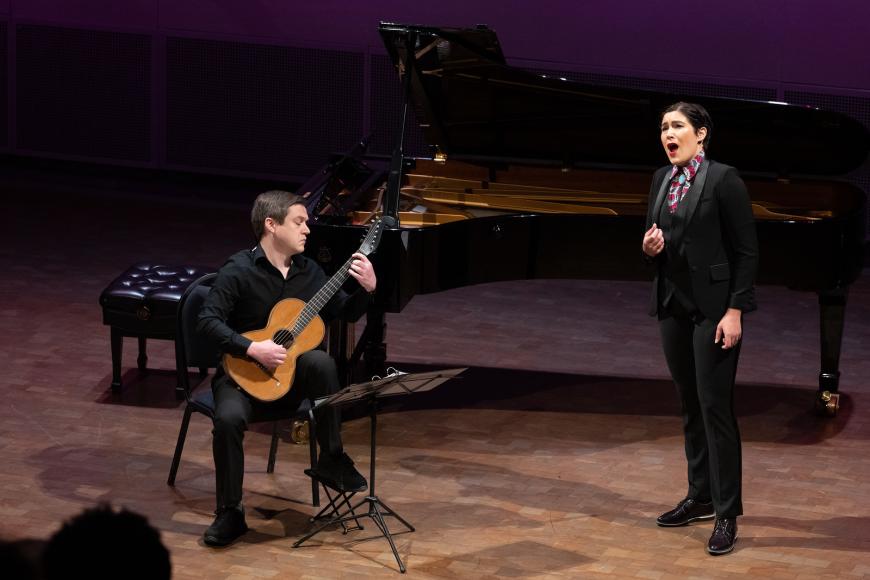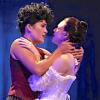
You won’t attend many vocal recitals where the singer’s costume changes are an integral part of the program, but that was the case with mezzo-soprano Nikola Printz’s dazzling Schwabacher recital on March 15, 2022. The recital had a name: “En Travesti” (“dressed as a member of the opposite sex for a theatrical role”), and if you’re thinking of all the operatic pants roles that are traditionally sung by mezzos, you’d start to approach the truth of this recital.
Those costume changes mirrored the construction of the recital, which Printz characterized in the printed program notes as a “three-part journey through exploring gender diversity and expansiveness.” The entire recital, and the songs performed, expressed how Printz has come to understand themself as a nonbinary person.
You also won’t see many recitals with the sheer stylistic range of this one, all of it performed with full-throated vocalism and raw emotional honesty. Printz can scale their rich mezzo up for an operatic climax or down to a fine thread of sound, with an astounding range of color. It was the kind of recital you want to hear all over again, if not immediately, then in a week or two or three.
The first part of the program, called “La Premiere Femme” (The first woman), addressed the more feminine side of life. For this section, Printz wore a flouncy white dress, short and strapless, with bright red shoes. The Barbara Strozzi song “Lagrime mie” (My tears), performed with Jon Mendle on theorbo, is a dramatic lament with a highly decorated melodic line, full of slides and trills and grace notes. It’s addressed to the singer’s tears, because the young woman the singer loves is trapped at home by her overprotective father. And the work takes on a notably queer edge when performed by a nonbinary singer wearing a dress.

Rossini’s charming trio of songs, “La regata veneziana” (The Venetian boat race), takes a more traditional turn, as a young woman, Anzoleta, watches her lover, Momolo, row in a boat race that he eventually wins. Printz performed these as a tiny monodrama, with every emotion Anzoleta experiences visible on her face and in her body. You could practically see the Venetian lagoon and feel the sun on the water. For this and the majority of the program, collaborative pianist Erica Xiaoyan Guo joined Printz, and the two worked together as if one, though all the changes of style and period.
Printz introduced the final two songs in this section from the stage, noting that they intended the pair to be in dialogue with each other. These were Alma Mahler’s “Licht in der Nacht” (Nocturnal light) and David Lang’s “I was a woman,” from the opera prisoner of the state.
In the Mahler, chromatic and intense, a light shines and is then extinguished; in the Lang, a person sings of how things were, once, when they were a woman, which they are presumably not now: very much a part of the gender journey in Printz’s life. Pianist Guo closed the section with a marvelously flexible reading of Louise Farrenc’s filigreed Étude in F-sharp Minor, Op. 26, no. 10, the kind of playing that makes you want to hear more of both performer and composer.
For the second part of the program, “Un Ballo in Masculine-era,” an expression of masculine energy and vitality, Printz changed into black slacks, vest, and tailored jacket over a plaid shirt, with patent-leather shoes. Printz opened with a set of brief, witty, songs by Ned Rorem, teasing and flirting with the audience all the way.

Printz remarked that they could see themselves singing to friends with a guitar, and so Mendle returned with a 19th-century guitar for a pair of Schubert songs: “Ständchen” (Serenade) from Schwanengesang, and “Der Leiermann” (The hurdy-gurdy man), the grim conclusion of Winterreise. These received breathtaking performances of great concentration, with the scale of the guitar’s sound adding to the intimacy of the experience.
Special kudos to Mendle for this and for his plaintive, ruminative contribution to the Strozzi; you couldn’t tell that he joined the program with only 24-hours’ notice. The section closed with two impassioned Spanish songs, Agustin Lara’s “Aquel Amor” (That love), about life-destroying love, the other Facundo Cabral’s “No Soy de Aquí” (I’m not from here), about rootlessness and identity. The latter closes the text “... and being happy is the color of my identity,” which Printz quoted in their written program notes.
For their last act, called “Neutrois” (Gender neutral), Printz changed back to the strappy red heels, this time with an androgynous black, backless pantsuit and a hot pink jacket that they shed a number or two in. The set opened with three large-scale, operatic songs by Korngold that taken together express a mood of hope, perhaps an answer to the gloom of “Der Leiermann” and “I was a woman.”
Britten’s sly and surprising “Cabaret Songs,” to texts by W.H. Auden, formed the core of the set. They’re far more louche and bluesy than you’d expect from Britten, and all the more delightful for that. Printz gave each of them a positively slinky air. These songs certainly wouldn’t have been out of place in a cabaret.
At the end of the recital, having already shed their jacket, Printz took off their shoes and settled onto the piano bench, providing the accompaniment for Prince’s “Nothing Compares 2 U” and “How Come U Don’t Call Me Anymore.” For these numbers, they changed the coloration of their voice completely, to a more pop-oriented sound — and for “Nothing Compares 2 U,” they invited the audience to sing along.




